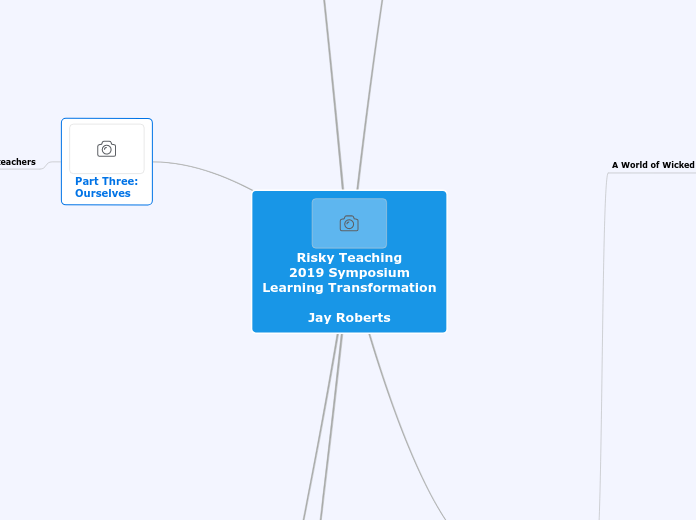av Jay Roberts för 3 årar sedan
469
Risky Teaching 2019 Symposium Learning Transformation Jay Roberts

av Jay Roberts för 3 årar sedan
469

Mer av detta
Personal connections
Small class sizes
Professional opportunity
Real world experience
Hands-on learning
Authenticity
Cultivate and nurture your EQ
Know Thyself
Infinite vs Finite Games
Edu-preneurship
75/25 rule
Remember the creativity curve
Be creatively restless
Fail fast, fail forward
James Lang
Metacognition
Active Learning
From: https://cei.umn.edu/active-learning
Instruction vs Learning
Is It Ever OK to Lecture?
"On the one hand, research on the matter is quite convincing: A 2014 meta-analysis of 228 studies of lectures and active-learning strategies showed that the results were decidedly one-sided in favor of active learning. So much so that the authors found it questionable ethically to make students attend lecture-based courses, given all that we know about how ineffective they are."
Barr and Tagg
The neuroscience of learning
Multi-modal
Pattern-seeking
Neuroplasticity
Stress/Threat
Sandra Huber: My Shadow Syllabus
http://www.cast.org/
Universal Design
Develop cross-cultural competencies
Concentrate on building an intentional classroom culture
Focus on empathy
Research is absolutely clear on the importance of relationship in learning
https://www.edweek.org/ew/articles/2019/03/13/why-teacher-student-relationships-matter.html
"A Review of Educational Research analysis of 46 studies found that strong teacher-student relationships were associated in both the short- and long-term with improvements on practically every measure schools care about: higher student academic engagement, attendance, grades, fewer disruptive behaviors and suspensions, and lower school dropout rates. Those effects were strong even after controlling for differences in students' individual, family, and school backgrounds. Teachers benefit, too. A study in the European Journal of Psychology of Education found that a teacher's relationship with students was the best predictor of how much the teacher experienced joy versus anxiety in class."
Advising is teaching
Grit, Resilience, and growth mindset
SOTS->GOTS->MITM
HOW?
Resource:
(Shameless Plug)
Experiential Methodologies
Work-Integrated Learning
Community-Based Learning
Project-Based Learning
Put the Experience before the Label
WHY?
American Academy for the Advancement of Science: “As biology faculty, we need to put the “depth versus breadth” debate behind us. It is true today, and will be even more so in the future, that faculty cannot pack everything known in the life sciences into one or two survey courses. The advances and breakthroughs in the understanding of living systems cannot be covered in a classroom or a textbook. They cannot even be covered in the curriculum of life sciences majors. The time has come for all biology faculty, but particularly those of us who teach undergraduates, to change the way we think about teaching..." (Vision and Change Report, 2009)
WHAT?
Education as the "continuing reconstruction of experience" J. Dewey
It is not (just) about the content
Data-Information-Knowledge-Wisdom
Transformation
"We all know or sense that the academy today is in the throes of transformation. The knowledge, skills, and values in which students should be educated; the intellectual landscape of the disciplines and degrees; the ways in which educational institutions are organized; the funding of teaching, learning, and research-- all of this promises to be profoundly different in 20 years. The forces of change have resulted partly from our own inertia, partly from consequences of our success, and partly from broad political, market, and technological developments not of our making. The question is not whether the academy will be changed, but how." (Scobey, Civic Provocations, 2012)
The Risk: What if we changed from "majors" to "missions"?
Solvable by any one discipline?
Do our current educational structures prepare students to work and thrive in these kinds of contexts?
The world is full of complex, unscripted problems where the answers are not immediately known and the consequences matter. AAC&U LEAP Initiative
"Easily" solvable?
Water Rights
Hunger and Food Insecurity
Violent Extremism
Global Health Pandemics
Gender Inequality
Climate Change
Wicked Problems
Time stress
Uncertain, unclear data
High potential for unforeseen consequences
Dispersed responsibility and power
Contested and Complex
The Risk: What if we stopped grading?
The turned soul
ROI and Career?
Competencies
Institutional/Departmental Learning Goals
"Out of class" learning
The Risk: What if the formal curriculum isn't the point after all?
Disrupting Ourselves
"By using the phrase “disrupting ourselves” ... I am asserting that one key source of disruption in higher education is coming not from the outside but from our own practices, from the growing body of experiential modes of learning, moving from margin to center, and proving to be critical and powerful in the overall quality and meaning of the undergraduate experience. As a result, at colleges and universities we are running headlong into our own structures, into the way we do business." (Bass, 2012)